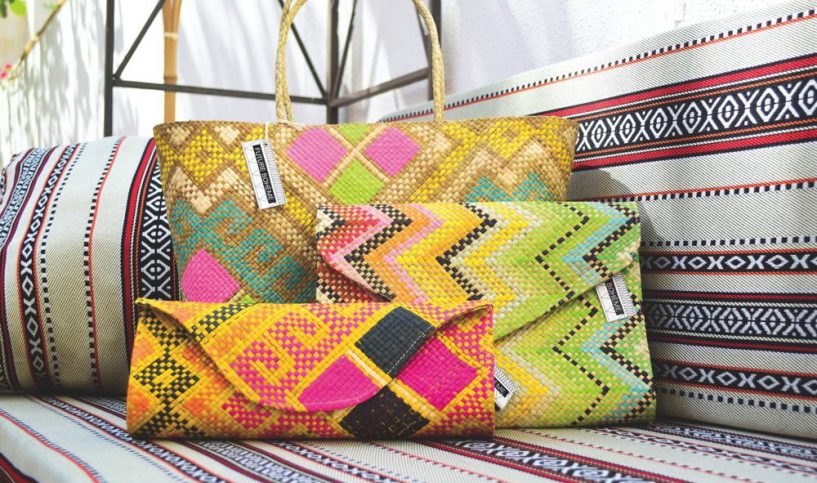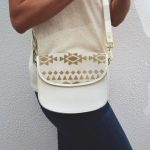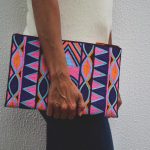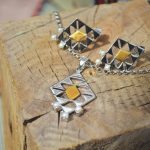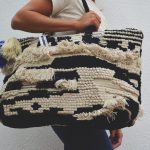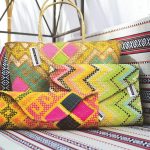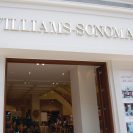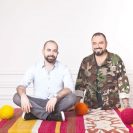By Lynda Higgs
During March I visited StreetFest Kuwait, which showcased a variety of small businesses based here in Kuwait, but it was the beautiful range of vibrant, artisan-produced textile products on the Future Bohème stand that really caught my attention.
Founded by the lovely Bri Anabtawi, whose enthusiasm for handcrafted textiles and textile products is infectious, Future Bohème offer their customers products that are produced by traditional, artisanal craftsmen and sourced in locations that are a long way away from glossy, air-conditioned malls and global, high-street brands.
Originally from pretty Coffs Harbour, New South Wales, Australia, Bri has traveled extensively since her early childhood, initially with her parents and siblings and then as a result of her work in the travel and tourism industry. I asked Bri if her love of textiles was a direct result of her travels: “Yes, definitely, but it’s also inspired by mum and dad’s collection. They used to come home from our travels with suitcases full of bits and pieces: rugs, wall hangings, pottery, ceramics, which still decorate the walls of our family home. I guess I just picked it up from them. Also, my mother loves textiles and we would regularly trawl through secondhand shops, markets and so on for hidden gems. Every time I go back home to visit, mum and I head off to explore shops and markets together; it’s become a ritual for us.”
I suggested that for someone with a love of textiles and collectibles, discovering Kuwait’s Fabric Souk must have been like opening up a huge parcel of gifts.
“The fabric souk is fantastic!”, enthused Bri. “Kuwait is actually a bit of a hidden gem, because there’s not a big tourism industry here, most people don’t know of the fabric souk. I find that the local textiles are on a par with some of the best (elsewhere) and they are reasonably priced. The range and quality of the materials available is breathtaking and Souk Mubarakiya is a treasure trove of items from all over the Middle East and Western Asia. In particular I like the fact that so much of what you come across has a real history to it.”
That what she buys and sells has history, is definitely part of the Future Bohème ethos, giving her products an authenticity lacking in some global brands.
“Yes,” agreed Bri. “When you see beaded or Boho-embroidered pieces in global, high street stores you just have to look at their tag to see that they are mass produced in a factory and are essentially disposable. I have made a point of taking the time to source producers who use traditional methods to create beautiful, unique items for the contemporary market. For example, one of the companies I’m working with is Banago, who are based in the Philippines. They use traditional methods of weaving palm materials, but incorporate modern patterns in their designs creating a bespoke product that will appeal to the 2015 market.
Bri also makes sure to source as many Fair Trade producers as she can, thereby ensuring that her customers are putting money back into small communities and preserving cultural traditions. In fact, the area of the Philippines where Banago is located was devastated by Typhoon Haiyan in 2013 and has only recently completed reconstruction, so Future Bohème’s customers are literally supporting a small group of artisans through buying their bags.
Bri developed the concept that has become Future Bohème in 2012 when she was on maternity leave, as she wanted to do something creative and explore a different career which afforded her the opportunity to do something she cared about. I asked Bri if it was her intention to develop the brand into something bigger in the long term. She laughed and said, “In a perfect world, I would have a real market presence and a store front, but I’m still new to the Kuwaiti market and only started operating 5 months ago. My main aim is to work with local artists and designers and bring a more Middle Eastern flavor to the brand, as there are so many great things to celebrate (in the Middle East). For example, I’ve recently added a range of jewelry inspired by traditional Sadu design. Through my research and a visit to Sadu house I was lucky enough to contact Nadia, from Noon Jewellery Design, who creates beautiful Sadu-inspired pieces, all based on traditional Kuwaiti patterns and designs, and is 100% designed and produced here in Kuwait. Nadia is a joy to work with and she is always coming up with exciting new products that perfectly marry the traditional and the contemporary. The jewelry is definitely becoming a key part of our range.”
Bri sources products from the Wayuu tribe in Columbia, northern Thailand, Australia and Madagascar, so hers is a truly global brand. “In fact, I’ve just returned from northern Thailand where I met our supplier and got to meet the producers, which was a really special travel experience. I know where everything I sell comes from and that everything is handmade. Buying a bag or piece of jewelry from Future Bohème my customer can be sure they have a one off piece from a limited range, offering authenticity and exclusivity in one beautifully crafted item.”
Beautiful, individually hand-crafted products that are practical and ensure the preservation of cultural heritage seems like a win-win situation to me. Who needs another mass-produced KD10 handbag when you accessorize with authenticity?
Future Bohème products can be purchased via Instagram @futureboheme and their online store www.futureboheme.com and can provide same day delivery. Photography by LyndaHiggsPhotography



